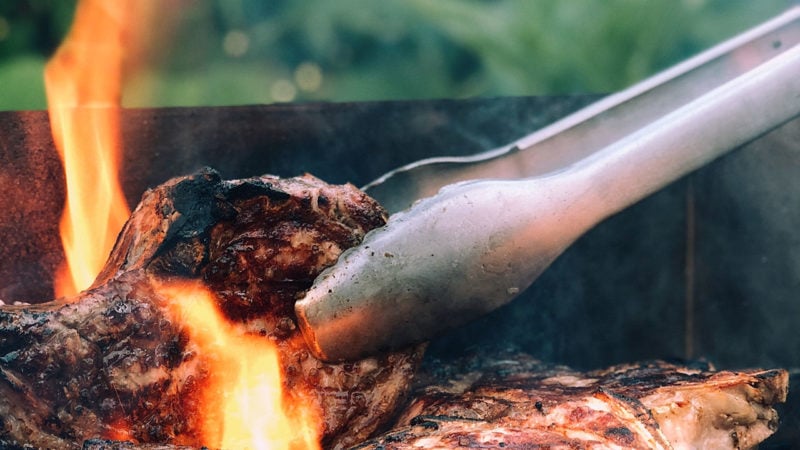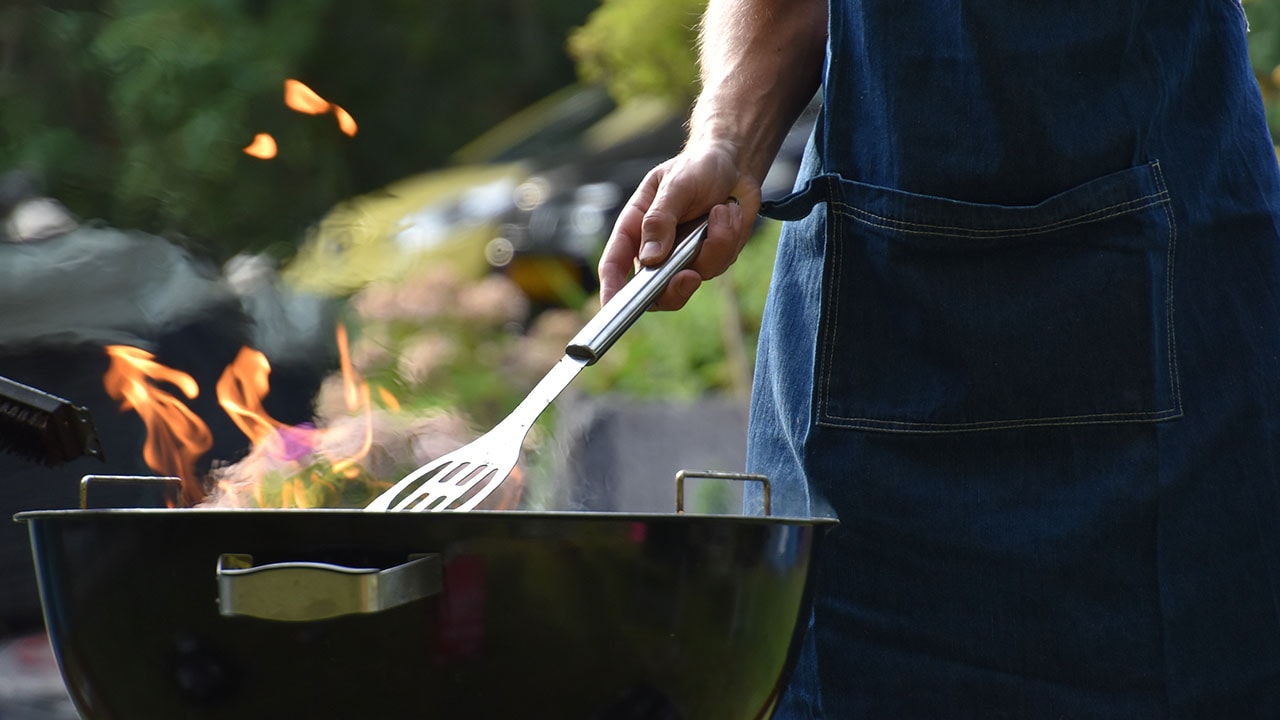Last Updated on June 19, 2020
With summer upon us, outdoor grilling is a cornerstone of home cooking. Whether you prefer the characteristic char of a charcoal grill or the ease and convenience of a gas grill, there are some key tools you’ll need to get the most out of your grilling escapades.
We’ve broken down the essentials, including the inexpensive basics like grill brushes, meat thermometers, and grill baskets.
We also discuss the pricier investments, like a decent set of knives, and, of course, the perfect grill.
Read on for the seven essentials you’ll need to man the grill safely, effectively, and deliciously.
1. Long-handled Spatula and Tongs
When it comes to manning a hot grill, it’s imperative you protect yourself and get the right tongs and spatula for the job.
You’ll want a spring-loaded, long-handled pair of tongs to pick up and rotate nimble hunks of meat without worrying you’ll burn yourself. These are also key to oiling your hot grill grates; simply roll up or fold a rag or paper towel, dip it in your preferred high-temp cooking oil, and grip it with your tongs. Pro Tip: Rubbing down the grates with olive oil so that nothing sticks is one of ButcherBox Chef Yankel’s keys to grilling anything right.
Similarly, you’ll need a wide, flat, and long-handled spatula for flipping burgers and other large hunks of meat or veggies. Ensure it’s a heat-resistant material (likely metal) and flip away.
2. A Wire Grill Brush
A sturdy grill brush with wire bristles is all you really need when it comes to regularly cleaning your grill grates—bonus points if your brush includes a scraper for cleaning off truly stuck-on gunk.
A clean grill isn’t just a nicety—it’s also a safety concern. When a grill builds up carbon deposits, it can harbor bacteria and cause the grill to heat unevenly. This both hampers your grill’s performance and can lead to long-term damage.
Use your wire brush after every grilling session to keep the buildup down, and give your grill a thorough cleaning a couple of times a year.
Oh, and if you’re of the mindset to enjoy an ice-cold beverage while you barbecue, don’t feel shy about investing in a grate cleaner with a bottle opener, you’ll thank me later.
3. A Good Meat Thermometer
A good, instant-read meat thermometer will do you more good than just at the grill—you can use it for roasting meat and all your indoor temping needs.
An instant-read meat thermometer is the best gauge of a grilled meat’s doneness. A good one will read off your meat’s internal temperature (give or take a few degrees) within seconds.
An instant-read meat thermometer consists of a stainless steel stem that works as a temperature probe, with an analog or digital reader. This is different from the kind of meat thermometer that’s left in the meat as it cooks.
Always insert your thermometer into the thickest portion of the meat, and be sure to cook it to safe recommended temperatures. Sanitize it between uses to avoid cross-contamination.
Bonus Tip: A reliable digital meat thermometer might set you back a bit of money, but it is worth it if you really spend a lot of time cooking meat, whether on the grill or indoors. ButcherBox Chef Emilie and Chef Yankel both love the Thermapen instant-read thermometer.
4. Grill Basket
Grills are wonderful for roasts, chicken breasts, pork chops, and all kinds of hearty cuts of meat. But that’s not all their good for—you can get an unbeatable char and smoky grill flavor on even the smallest of veggies with a grill basket.
Plus, grill baskets let you cook your whole meal on the grill and maximize space.
To grill up some veggies, cut them into uniform pieces. Toss your veggies with a bit of olive oil and your favorite herbs and seasonings. Preheat your grill basket, along with your grill, before adding your veggies.
5. A Decent Knife
All good cooks need a sharp, well-made knife—the same remains true for outdoor grillmasters.
In reality, you need a few different knives to accomplish most of your grilling needs. A chef’s knife will perform the brunt of the work—chopping, dicing, peeling, and smashing. A paring knife allows you to cut through hard-to-reach places—especially when breaking down a hunk of meat—while a slicing knife is key for cutting through roasts.
Look for a knife made with a durable metal that’s well-sharpened (you should pick up a whetstone to re-sharpen your knives when the time comes). If you’ll be working with your knives a lot, make sure they’re well-balanced and comfortable to hold.
6. A Large Wooden Cutting Board
Why should you opt for wooden cutting boards? They’re durable, for one, but they also prove more anti-microbial and resistant to bacteria than their plastic counterparts.
A plastic cutting board requires vigilant cleaning to ensure there are no bacteria hiding in the knife-made grooves. Meanwhile, wood doesn’t hold onto bacteria in the same way.
While both are considered safe, a wood cutting board will prove more durable in the long run, meaning you’ll get more longevity out of your board before it needs to be replaced.
7. The Perfect Grill
To grill outdoors, you will need a grill, of course! There are two main types of grills. Here are the breakdowns for each.
Charcoal Grills
There’s nothing like the characteristic flavor of food cooked on a charcoal grill, though they can be considerably fussier than their gas counterparts. They’re more portable, often more inexpensive, and won’t flare up in flames like a gas grill.
Plus, charcoal burns hotter than gas, and you can create direct and indirect heat areas pretty easily. Still, charcoal grills can be a touch messy and ashy.
Gas
Convenient and easy to clean, gas grills make easy work of a grilled meal. Gas is a cheaper fuel than charcoal, and if you’d like a built-in grill, you can hook it up to a gas line. They are usually the more expensive option, and they’re less portable.
Both grills allow you to whip up deliciously smoky and charred meals, so whichever route you go, get out there and grill!




